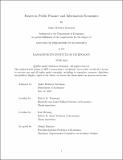Essays on Public Finance and Information Economics
Author(s)
Medeiros Sztutman, André
DownloadThesis PDF (2.681Mb)
Advisor
Townsend, Robert M.
Werning, Iván
Terms of use
Metadata
Show full item recordAbstract
This thesis comprises three chapters on public finance and information economics. The first focuses on the interaction of imperfect information in labor markets and the tradeoffs the government faces when setting
on-linear taxes. The second focuses on the role of heterogeneity in elasticities in affecting those tradeoffs. The third focuses on the imperfect information in financial markets and on how to design disclosure rules to increase the size of gains from trade in lending markets when these markets are adversely selected.
The first chapter asks how optimal taxes are affected by reputation building and imperfect information in labor markets. To answer that question, I build a model of labor markets with incomplete and asymmetric information where job histories play a crucial role in transmitting information about workers' productivity, which allows us to better understand the efficiency and distributive consequences of imperfect monitoring and screening in labor markets, and the tradeoffs the government faces when setting taxes. Optimal taxes are described by generalized versions of standard redistributive and corrective taxation formulas, which depend crucially on labor wedges: the marginal contribution to output relative to the increases in lifetime earnings that result from supplying one extra unit of labor at each period. Using data from the Health and Retirement Study, I find that the corrective component of taxes is likely to be large, especially at the top of the income distribution.
The second chapter (joint with John Sturm) asks how income taxes should account for heterogeneity in elasticities of taxable income. We address this question with a test that passes if and only if there exists a weighted utilitarian planner for whom taxes are locally optimal. Our test incorporates standard sufficient statistics and a novel ingredient: the variance of elasticities conditional on income. Theoretically, we show that the test fails when these variances are sufficiently high. Empirically, we find they are indeed large in a panel of US tax returns. We thereby conclude, without taking a stance on redistributive preferences, that there are welfare-improving tax reforms.
The increasing availability of data in credit markets may appear to make adverse selection concerns less relevant. However, when there is adverse selection, more information does not necessarily increase welfare. The third chapter (joint with Robert M. Townsend and Nicole Immorlica) provides tools for making better use of the data that is collected from potential borrowers, formulating and solving the optimal disclosure problem of an intermediary with commitment that seeks to maximize the probability of successful transactions, weighted by the size of the gains of these transactions. We show that any optimal disclosure policy needs to satisfy some simple conditions in terms of local sufficient statistics. These conditions relate prices to the price elasticities of the expected value of the loans for the investors. Empirically, we apply our method to data from the Townsend Thai Project -- a long panel dataset with rich information on credit histories, balance sheets, and income statements -- to evaluate whether it can help develop rural credit markets in Thailand, finding economically meaningful gains from adopting limited information disclosure policies.
JELClassification: H2,D8,J2,I3,G2.
Date issued
2023-06Department
Massachusetts Institute of Technology. Department of EconomicsPublisher
Massachusetts Institute of Technology